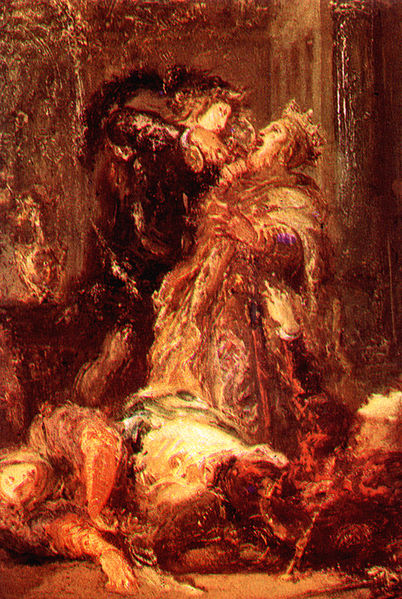Hamlet: Did his perplexing neurotransmitters cause the tragedy?
The neuroscientist working from a mechanical perspective would study the material and efficient causes of Hamlet’s act of revenge.
William Shakespeare (1564–1616) probably wrote Hamlet: Prince of Denmark between 1599 and 1601. Innumerable books have been written about the enigmatic central character from the broadest variety of perspectives.
Mechanical analogies in neuroscience—the view that the brain (and thus the mind) are machines of a sort—emerged from the philosophical work of René Descartes, Thomas Hobbes, Francis Bacon, and others during the age sometimes called the Scientific Enlightenment, roughly the seventeen through the eighteenth centuries. They focused on two of the four causes inferred by Aristotle, the material and efficient causes. They set aside—and ultimately denied the reality of—formal and final causes.
Understanding the brain and the mind as the product of material and efficient causes is ultimately to understand the brain and mind as machines. Their focus on the “mechanical” aspects of the human nervous system advanced certain types of research and inferences and suppressed others.
The ascendancy of mechanical analogies in neuroscience in the past few centuries has had a profound influence on our understanding of the human brain and mind. Some of the research guided by this implicit (and often explicit) metaphysical bias has, of course, been quite fruitful. But in important respects, it has greatly hindered our understanding of man.
To see this more clearly, consider how a neuroscientist working from a “mechanical” bias might understand Hamlet’s killing of his uncle Claudius (who murdered Hamlet’s father, married his mother, and usurped the throne) near the end of the play.
The neuroscientist working from a mechanical perspective would study the material and efficient causes of Hamlet’s act of revenge. The “mechanistic” scientist would investigate Hamlet’s neuroanatomy and neurophysiology—the localization of his emotional and motor activity in his amygdala and motor cortex. He would study the secretion of neurotransmitters in the Prince of Denmark’s brain and spinal cord and the propagation of action potentials through his nerves and the contraction of his muscles as delivered the fatal blow.
But what of Hamlet’s understanding and motives? What of his grief, his anger, his confusion, his indecision? What of Hamlet’s profound personal angst, which is the core of Shakespeare’s play?
The mechanistic neuroscientist—ostensibly devoted to a comprehensive understanding of Hamlet’s mind and brain—would have little of relevance to say about Hamlet’s complexities. Perhaps the scientist could pinpoint some imbalance of neurotransmitters or a storm of dendritic depolarizations in the prince’s limbic system, but such neurophysiology would add little to our understanding.
Consider how a neuroscientist working from an Aristotelian perspective that takes account of all four causes in nature would seek to understand Hamlet. The formal cause of Hamlet’s murder of Claudius is Hamlet’s imagination and intellect—his growing awareness of the true circumstances of his beloved father’s death and his agonizing understanding of Claudius’s (and his mother’s) complicity and motives.
The final cause of the murder is Hamlet’s passion and will. His passion—his aching for revenge—is intense but his will is hampered by his indecision and his conscience. When he comes to fully understand what has transpired, he acts with decision and fury, ending the lives of his father’s betrayers, as well as his own.
The formal and final causes of Hamlet’s murder of Claudius are, of course, the subject of Shakespeare’s play. The study of the depth and complexity of Hamlet’s knowledge, passion, intellect and will has fascinated and challenged readers for centuries.
It is essential to note that the Aristotelian neuroscientist, while delving into the complexities of Shakespeare’s remarkable psychological portrayal of this tortured man, can also study Hamlet’s murder of Claudius in just the same way that the mechanistic neuroscientist can. The Aristotelian can, if he so chooses, focus on the material and efficient—the anatomical and physiological—aspects of Hamlet’s acts and his demise. But he doesn’t lose the plot.
Nothing is lost in the Aristotelian approach to neuroscience. The Aristotelian neuroscientist is perfectly comfortable in the laboratory, studying isolated material and efficient causes. Neuroanatomy and neurophysiology are as much the domain of Aristotelian hylomorphism as they are of mechanical philosophy. Yet the hylomorphic understanding does not stop at mechanical causes. The Aristotelian neuroscientist can study Hamlet from the perspective of formal and final causation as well, using the tools (the literary study of Shakespearean drama) appropriate to the understanding of imagination, passions, intellect, and will. The Aristotelian neuroscientist can even seek the consilience between Hamlet’s neurophysiology and his angst—the interplay of material and efficient, and formal and final, causation.
Thus, mechanistic neuroscience is neutered science. It is a science that is deliberately ignorant of formal and final causes. There are, of course, circumstances in which its constriction of perspective is appropriate—in the laboratory for example. But the mechanistic neuroscientist is foolish to think that he can offer anything but a limited understanding of the human mind and brain.
Perhaps the most important aspect of any theory of nature is not what it reveals, but what it conceals. All theories conceal something—only the full truth reveals all of nature. Mechanical neuroscience conceals very much of man. Man has neurons and neurotransmitters but man also has imagination and intellect and passion and will. Man is a composite of material and immaterial reality—a composite of material, efficient, formal, and final causes. We can no more understand the human mind and brain by studying brain waves and neuroanatomy than we can understand Hamlet by dissecting him in a laboratory. Mechanical neuroscience, which is the deliberate constriction of knowledge of man to mechanical and efficient causes, conceals much—often too much—about imagination, passions, understanding, and acts.
Mechanical neuroscience can never be a deep understanding of man, and we are impetuous and foolish to think it so.
 Michael Egnor is a neurosurgeon, professor of Neurological Surgery and Pediatrics and Director of Pediatric Neurosurgery, Neurological Surgery, Stonybrook School of Medicine
Michael Egnor is a neurosurgeon, professor of Neurological Surgery and Pediatrics and Director of Pediatric Neurosurgery, Neurological Surgery, Stonybrook School of Medicine
Also by Michael Egnor: Yes, your brain is a machine—if you choose to see it that way
and
The brain is not a meat computer. Dramatic recoveries from brain injury highlight the difference

